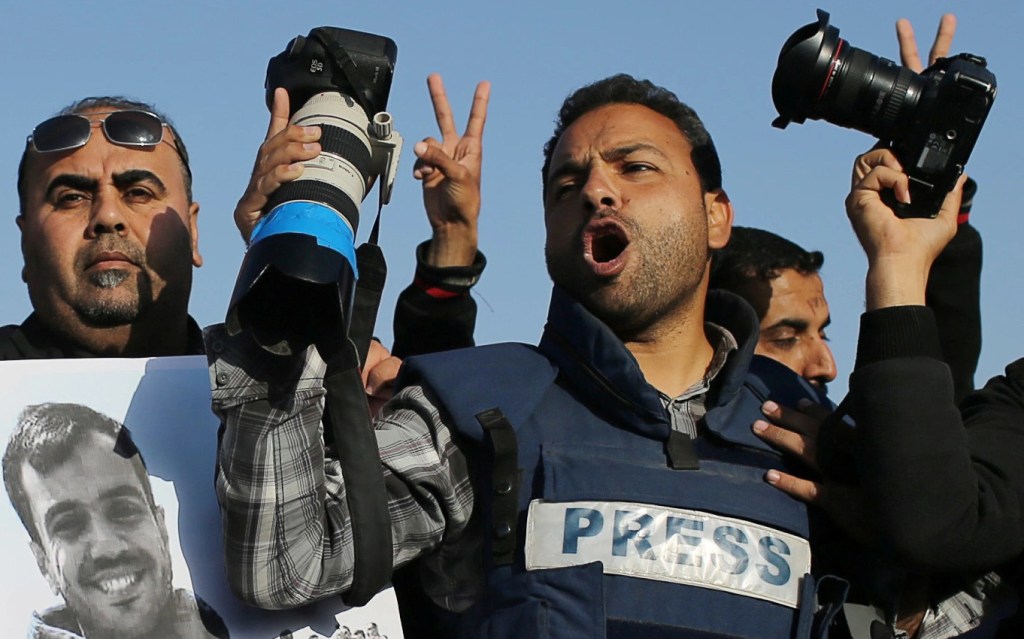Israel’s procedure for examining military killings of civilians such as journalists is a black box. There is no policy document describing the process in detail and the results of any probe are confidential.
- This feature is part of a CPJ special report: Deadly Pattern: 20 journalists died by Israeli military fire in 22 years. No one has been held accountable.
Also read: A deadly reporting field for Palestinian journalists
If an incident taking place during active combat raises the suspicion of a violation of international law, the office of the army chief of staff opens a preliminary examination known as “a fact-finding assessment.” The findings are passed on to the Military Advocate General who decides whether they warrant the opening of a criminal investigation. Since the assessments began in 2014, Israel has examined five journalist deaths and one large-scale bombardment that killed three journalists. Not one of these assessments led to a criminal investigation.
The assessments were supposed to bring the military justice system into line with international standards, but many Israeli and international human rights organizations dismiss them as cosmetic changes to a system that is still designed to shield soldiers.
The assessments, which were intended to be rapid and efficient, can drag on for years, according to Israeli human rights group Yesh Din and CPJ’s research. In the unusual event that an assessment triggers a criminal investigation, investigators have to start from scratch and cannot use anything uncovered during the assessment. This creates further delays, rights groups say, during which witnesses’ memories fade and evidence may disappear.
Once a “fact-finding assessment” is done it goes to the office of the Military Advocate General, a unit that human rights groups say is neither impartial nor independent. Yesh Din referenced the case of journalist Yousef Abu Hussein of Hamas’ Voice of Al-Aqsa Radio, who was killed at his home in Gaza in an IDF bombing in 2021. The Military Advocate General’s office “had a hand in approving the policy that classified Abu Hussein as a military target, provided clearance for the strike that killed him, or helped draft the criteria for proportionality when innocent civilians are harmed in an attack on a military target,” wrote Yesh Din. And yet the Military Advocate General was tasked with deciding whether to open a criminal investigation into his killing — and in this case did not.
In an email to CPJ, the IDF said of Abu Hussein’s killing: “It was found that the strike targeted a legitimate military target, was approved by the relevant officials, and was in accordance with the principle of proportionality,” meaning the military claimed that the circumstances of the killing comported with international law.
The Military Advocate General rarely opens criminal cases, or does so slowly. Yesh Din examined Israel’s track record in the 2021 military operation that killed Abu Hussein, Operation Guardian of the Walls. It found that as of one year later, the army had opened assessments into 84 incidents, but only began a criminal investigation into one. As of that time, the majority of the assessments were still ongoing.
When a criminal investigation is opened, it is conducted by the military police. For years, human rights groups have criticized these investigations as relying on soldier testimonies without gathering physical evidence or witness statements, or doing so long after the incident in question. Rights groups have said that military units involved in the incident are tasked with identifying suspects and witnesses, typically after debriefings in which accounts may have been coordinated and rehearsed.
“From Israel’s perspective, this isn’t about establishing accountability and protecting the rights of victims — it’s the opposite,” said Hagai El-Ad, head of Israeli human rights group B’Tselem. “I’m not expressing an opinion. B’Tselem has more inside information into the whitewashing of the killings of Palestinians than anyone else. We’ve investigated hundreds of cases — and we’ve done that while engaging directly with the Israeli authorities.”
However, B’Tselem is no longer cooperating with the Israeli army’s investigative system, saying in 2016 that it “would no longer play a part in the pretense posed by the military law enforcement system and will no longer refer complaints to it.”
Before the new mechanism came into place nine years ago, Israel opened preliminary probes or very basic checks into at least seven journalist killings. Only one of these yielded a criminal investigation, the 2003 death of British journalist James Miller. But his case was closed and authorities did not bring criminal charges. In at least five cases of journalist killings documented by CPJ, Israel did not announce any probe.
